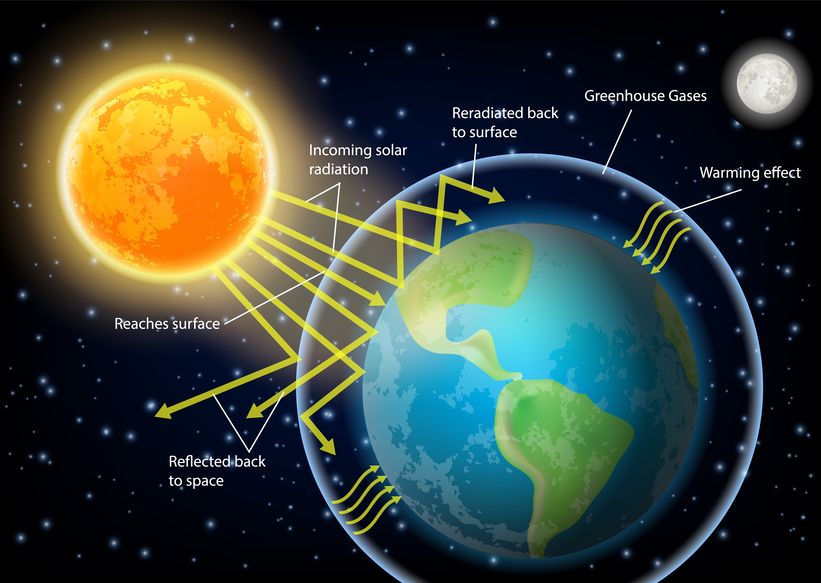
Greenhouse saturation research could kill the “climate emergency”
By David Wojick
The “climate emergency” appears to have died, far out on the scientific frontier. Word of this death has yet to reach the mainstream.
Professors William van Wijngaarden (Canada) and William Happer (USA) have published some extremely important research on the radiation saturation of the major greenhouse gases. Their first report is titled simply “Relative Potency of Greenhouse Molecules”. It makes use of a major breakthrough in radiation physics.
Until recently the estimates of greenhouse potency were based on approximation bands of absorbed radiation wavelengths. Now the authors have done line by line spectral analysis, looking at over 300,000 individual wavelengths within these bands.
It turns out that saturation occurs much sooner than previously thought. In particular the primary greenhouse gases, CO2 and H2O, turn out to be “extremely saturated” at present atmospheric concentrations.
These results strongly suggest that the dangerous multi-degree warming assumed by the climate emergency simply cannot occur. Is CO2 significantly impotent? This should now be a major research question.
The paper is here: https://arxiv.org/abs/2103.16465 Their second paper — Dependence of Earth’s Thermal Radiation on Five Most Abundant Greenhouse Gases — is here: https://arxiv.org/pdf/2006.03098.pdf
The second paper extends the research to include methane, nitrous oxide and ozone. All three have important climate policy implications, including agricultural policy. Methane in particular has become the target of a climate policy witch hunt. Professor Happer has an illuminating video on this topic. See my introduction and the video here: https://clintel.org/agriculture-policy-is-a-climate-change-witch-hunt/.
I first wrote about this ground breaking research a year ago, see my article: https://www.cfact.org/2020/09/26/study-suggests-no-more-co2-warming/. Since then I have done a bit of research on their research. There is almost nothing on greenhouse saturation in the scientific literature and that needs to change.
Aside: there is a huge literature on “CO2 saturation” but it is about the saturation of porous rock during deep well injection. This is a big problem with so-called carbon sequestration, where CO2 is removed from our emissions and (hopefully) stored underground.
There is also some confusion. As explained below, saturation is not an absolute, rather it comes in degrees. There is no such thing as complete saturation, so when a scientist says CO2 is saturated they mean a lot saturated, not completely saturated. This is important because I have found several articles where the author says skeptics claim CO2 is saturated and then points out that it is not completely saturated. This is just a straw man argument because skeptics who know the science never claim complete saturation.
CO2 Saturation explained: The surface emits a limited number of photons (or units of radiation) of the sort that atmospheric CO2 absorbs. In effect the molecules are competing for the available photons. So as the number of CO2 molecules increases the absorption per molecule goes down. More and more molecules are looking to absorb the same number of radiation photons.
The greenhouse warming is based on the absorption not on the number of molecules. Thus the warming potency of the CO2 does not rise nearly as fast as the number of molecules. This diminishing effect is called “saturation”.
The warming first drops off rapidly as the number of molecules increases. This means most of the warming occurs when the number of molecules is relatively small, far fewer than we have today. After that the warming changes very little as more and more molecules are added. That is where we are today, with a little over 400 ppm of CO2 molecules. The CO2 is extremely saturated. Even doubling the number of molecules to over 800 ppm would have relatively little warming effect.
That H2O is also extremely saturated is very important. Much of the amplified warming built into the emergency computer predictions is based on a strong positive water vapor feedback from the relatively modest CO2 induced warming. But as water vapor is already extremely saturated this strong feedback cannot occur, even if the number of water vapor molecules increases a lot.
More broadly, all of the scary IPCC warming projections are entirely based on these five gases creating a lot of future warming. None of the climate models include the high degree of saturation found by Professors van Wijngaarden and Happer. And according to these researchers, their pioneering results are confirmed by satellite measurements of radiation.
In short it looks like the IPCC climate modeling is simply obsolete. The models need to be redone to include all this saturation. And of course there is a lot more research to be done on greenhouse saturation itself.
But in the meantime it looks like the so-called climate emergency is dead. It has been killed by a big breakthrough in radiation physics. The greenhouse effect does not work the way the scary computer models have all assumed, instead it is dominated by saturation.
This is how science is supposed to work: hypotheses die as science advances.
Author
David Wojick, Ph.D. is an independent analyst working at the intersection of science, technology and policy. For origins see http://www.stemed.info/engineer_tackles_confusion.html. For over 100 prior articles for CFACT see http://www.cfact.org/author/david-wojick-ph-d/ Available for confidential research and consulting.
From cfact.org